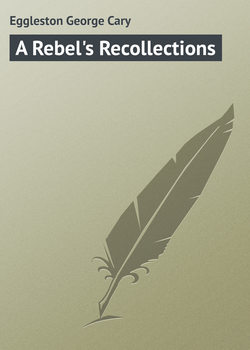A Rebel's Recollections

Реклама. ООО «ЛитРес», ИНН: 7719571260.
Оглавление
Eggleston George Cary. A Rebel's Recollections
CHAPTER I. THE MUSTERING
CHAPTER II. THE MEN WHO MADE THE ARMY
CHAPTER III. THE TEMPER OF THE WOMEN
CHAPTER IV. OF THE TIME WHEN MONEY WAS "EASY."
CHAPTER V. THE CHEVALIER OF THE LOST CAUSE
CHAPTER VI. LEE, JACKSON, AND SOME LESSER WORTHIES
CHAPTER VII. SOME QUEER PEOPLE
CHAPTER VIII. RED TAPE
CHAPTER IX. THE END, AND AFTER
Отрывок из книги
Lunching one day with Oliver Johnson the best "original abolitionist" I ever knew, I submitted to him the question I was debating with myself, namely, whether I might write this little volume of reminiscences without fear of offending excellent people, or, still worse, reanimating prejudices that happily were dying. His reply was, "Write, by all means. Prejudice is the first-born of ignorance, and it never outlives its father. The only thing necessary now to the final burial of the animosity existing between the sections is that the North and the South shall learn to know and understand each other. Anything which contributes to this hastens the day of peace and harmony and brotherly love which every good man longs for."
Upon this hint I have written, and if the reading of these pages shall serve, in never so small a degree, to strengthen the kindly feelings which have grown up of late between the foemen of ten years ago, I shall think my labor well expended.
.....
There was one other peculiarity in their church relations worthy of notice. The Episcopal Church was once an establishment in Virginia, as every reader knows, but every reader does not know, perhaps, that even up to the outbreak of the war it remained in some sense an establishment in some parts of the State.
There were little old churches in many neighborhoods which had stood for a century or two, and the ancestors of the present generation had all belonged to them in their time. One of these churches I remember lovingly for its old traditions, for its picturesqueness, and for the warmth of the greeting its congregation gave me – not as a congregation but as individuals – when I, a lad half grown, returned to the land of my fathers. Every man and woman in that congregation had known my father and loved him, and nearly every one was my cousin, at least in the Virginian acceptation of that word. The church was Episcopal, of course, while the great majority, perhaps seven eighths of the people who attended it and supported it were members of other denominations – Baptists, Presbyterians, and Methodists. But they all felt themselves at home here. This was the old family church where their forefathers had worshiped, and under the shadow of which they were buried. They all belonged here no matter what other church might claim them as members. They paid the old clergyman's salary, served in the vestry, attended the services, kept church, organ, and churchyard in repair, and in all respects regarded themselves, and were held by others, as members here of right and by inheritance. It was church and family, instead of Church and State, and the sternest Baptist or Presbyterian among them would have thought himself wronged if left out of the count of this little church's membership. This was their heritage, their home, and the fact that they had also united themselves with churches of other denominations made no difference whatever in their feeling toward the old mother church, there in the woods, guarding and cherishing the dust of their dead.
.....